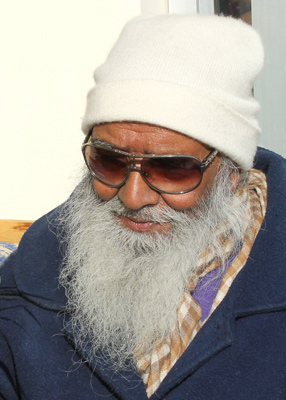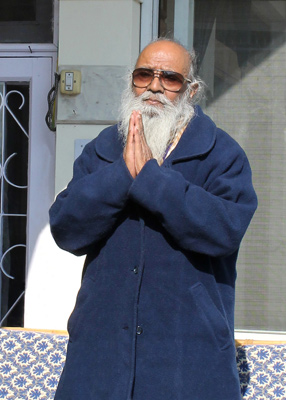If You Use Your Mind, Vichar Will Never Come

How does it happen that a soul comes on earth? The jeev (soul) is like a bubble— how does a bubble come in the ocean? How does a wave come in the ocean? How does blueness come in the sky? How does heat come in the sun? How does a jeev come on earth? The main thing is this. The jeev is the individual. It has ego-intellect-mind, senses and organs—and connected bodies and elements. How will you know all these things if you do not know the jeev? So, what is the jeev?
How can a human ego-intellect-mind with his thinking know this? Thus, it is said that if you can use vichar (Self knowledge), then it is possible for you to know what the jeev is. Suppose there is a rope. How does it become a snake—a jeev? A snake is a jeev, a rope is not. A jeev frightens and is frightened. How would you know the jeev? How would you know an individual? He has a name and a form, and you know this as an individual. All the individuals are on the voting list: a child is born with a name and form, so one vote came. It is known whose son he is, from what locality and from which country. But it is a jeev who came. All jeevas are sentient beings. Yet because animals cannot cast their votes, so nobody records their births—although they are also jeevas. [Laughter]
Devindra has indicated that it is only possible for a human being to know this if he uses vichar, which Glen will say means thinking. Vichar means thought—you have seen this in the dictionary. You can see it again. But if you use vichar to know vichar, if you use thinking to know thinking, how will it be possible? How can you know vichar in the way that the baby finger can try to know the baby finger? So vichar cannot be of the mind. How would you use vichar when man only has mind?
Devindra: Does vichar start with the mind, Swamiji?
Swamiji: If it starts with the mind, then what is the mind?
Devindra: A vehicle.
Swamiji: Then who starts it?
Devindra: Well, if vichar is fulfilled or realized, then it is that same Being that starts vichar.
Swamiji: If the same Being is there, then the same Being should be used to know the mind. When you do not know the same Being, how would you know vichar? It is said that if you have vichar, then you can know the same Being. From where will vichar come? Yes, his finger indicates it: it comes from Guru. Guru is vichar, which means, he knows the mind. So if you use your mind, vichar will never come. Therefore, vichar is that who is Guru’s Awareness. Thus it is said, “Use your Awareness.” But your awareness is the mind. Even if you say Awareness is Atma Bhavana (Self Sense), then bhavana also means that a snake exists in a rope, that silver exists in an oyster, that a human being is born in the head of the mind—that is also bhavana. Then whatis bhavana? Thinking. How would you explain bhavana?
Aatma: A sense.
Swamiji: Sense is that a snake exists—that is also a sense. And sense is also that a rope exists. Then what is the difference between the rope and the snake and sense? Both are sense. Sense exists who knows Aatma. Sense exists who knows Dikpal. Sense exists who knows Glen. How will sense work? Animals also have sense. A butterfly also has sense for his mate. What is sense? Then sense is also not correct. So what is vichar?
Dikpal: Wouldn’t vichar be Atma bhavana, Adwait (Non-duality) bhavana?
Swamiji: You have read about Atma bhavana, Adwait bhavana. But I am asking, What is that Adwait bhavana? What is Atma bhavana? How can a mental man know it only using the ego-intellect-mind?
Dikpal: It is only vichar, only Guru. That’s all.
Swamiji: But from where will vichar come?
Dikpal: From Guru.
Swamiji: That is what I am saying. Guru is vichar. But you think, “Guru has no connection with me. He is a person, and he is a Guru. I am a person, and I am ready to use my vichar.” In that way, how would you use vichar of Guru?
Dikpal: I would listen to the words of Guru.
Swamiji: But if you listen to the words of Guru, then your words do not match with Guru’s. When you listen, you listen with all your words. Even if you listen to Guru, you will put in your words, and your words are already not Guru.
Aatma: Is that what you meant earlier when you said, “If I tell you to give up your mind, you will not relish it”?
 Swamiji: Yes. If you can give up the mind, what remains? Vichar. You have to give up the mind. But you are giving up the mind with the mind. So vichar, as he said, is the Being. Now, the Being cannot be known by a human being. So Guru says that when you close your eyes and know, then who is this body whom you call “me”? You will not know. This body has become ready by birth to do any activity of seeing and hearing. The body is born, and vichar is that who is not born. If you do not succeed in eliminating that who is born, you will have no vichar. That is vichar.
Swamiji: Yes. If you can give up the mind, what remains? Vichar. You have to give up the mind. But you are giving up the mind with the mind. So vichar, as he said, is the Being. Now, the Being cannot be known by a human being. So Guru says that when you close your eyes and know, then who is this body whom you call “me”? You will not know. This body has become ready by birth to do any activity of seeing and hearing. The body is born, and vichar is that who is not born. If you do not succeed in eliminating that who is born, you will have no vichar. That is vichar.
If you have that vichar and you apply that vichar everywhere, the whole world that you make tumbles down—Vichar alone is. That vichar is Anubhav (Pure Experience). If you have a dream and the dream is over, then we say you think that you had a dream. But your vichar will say, “There was no dream, it was Me.” Then the mind will say, “No, a dream was there, I have seen it.” Vichar will say, “There was no dream. There is also no waking state.” The mind will say, “No, there is a waking state and there is a dream state.” So there is a struggle between the mind and vichar. Whoever is balwan, whoever is strong, he will win.
Vichar is always of the Unborn. That is why I say that you are Unborn. That means I am leading your attention to your vichar. But you use your ego-intellect-mind, which is buddhi, the intellect. Vichar is pure, because it knows there is no birth, no body, no name. Thus vichar is hardly available with a man who has a mind. Vichar is available with Guru. Guru says, “You are Pure Free Forever.” That is your pure intellect. But the mind says, “No, no. I have this mind-ego-intellect. This works.” Such a man does shravan (hearing Guru) and then he does manan (assimilating what he heard). But he does it with his mind. After shravan, you should have the vichar “Why has Guru said that You are Pure Free Forever, you are not a human being?” So Guru has said vichar, but it does not become available for you. Instead, only ego-intellect-mind is.
Unless the mind is given up, you will not have vichar. And if you have no vichar, then you have no realization of your true nature, which is Pure Free Forever. To that we call Atma (Self), Amaram Hum Madhuram Hum—that which is neither born nor is going to die. That is vichar. If you have vichar, then there is nothing available for you to have that vichar. But Guru says, “Have the vichar which I have given you.” And his vichar is Amaram Hum Madhuram Hum.
Try to apply your mind to know Amaram Hum Madhuram Hum. It does not get the meaning, because the mind applies his own meaning: “What is Amaram Hum Madhuram Hum? Is it an avocado? Is it a mango? Is it a fig tree? Is it a seed, mountains, the Himalayas, the sun?” Mind knows this. But vichar is that who is the original Being. Mind stops this. He says, “Why say original Being? I am the original one.” He does not listen. So Suresh says the mind resists. Mind is not vichar, he is an object. He is jar (insentient) and chaytan (sentient); he is two, jar separate and chaytan separate—so the mind says.
This cannot be possible if you have vichar. In vichar, there is neither jar nor chaytan. Then it is vichar. Mind says the sky is blue. Vichar knows it is neither blue nor any other colour, it is only sky. If you have vichar, then you came to know the sky. If you do not have vichar and you have mind, then you say, “No, there is sky and blueness. There is gold and a ring.” Guru says, “Have vichar: The ring was never there, it was all gold.” But you say, “No, the ring is there.” That is the mind. Therefore, there is only one thing: if you have vichar, then in this examination, vichar stands alone. The whole world which the mind made is separated and vichar alone remains, which is the very Atma. So Atma is now Anubhav, Atma Anubhav. If you realize Atma, then it is the Atma who realizes. Otherwise, it will be repeating Guru’s words, “Atma Anubhav,” or “Atma Drishti,” or “Guru said this,” or “Scriptures said it,” and you are the one who is applying it. You are always applying the mind, and it does not work. That is why it takes seventy years [it was Dikpal’s seventieth birthday].
Therefore, there is only one thing: if you have vichar, then in this examination, vichar stands alone. The whole world which the mind made is separated and vichar alone remains, which is the very Atma. So Atma is now Anubhav, Atma Anubhav. If you realize Atma, then it is the Atma who realizes. Otherwise, it will be repeating Guru’s words, “Atma Anubhav,” or “Atma Drishti,” or “Guru said this,” or “Scriptures said it,” and you are the one who is applying it. You are always applying the mind, and it does not work. That is why it takes seventy years [it was Dikpal’s seventieth birthday].
Abhaya: Guru is vichar, and the mind is trying to understand that. The mind will not lead one to the real vision of Guru as vichar. Yet as a disciple, one makes that effort…
Swamiji: The disciple is the mind. The mind can make a hundred efforts.
Abhaya: My question is, Is it ultimately the grace that leads one from that sense of efforts and practice to the…
Swamiji: No. When all efforts are abandoned, then it is vichar. As long as you are making efforts—Is it this or is it that—then there is no vichar. You cannot explain vichar when you are quiet and there is no mind. For some time, you are in that state, and that is vichar. But the moment you apply the mind, the mind says, “No, there was nothing there.” It made itself nothing. So mind annuls vichar. And this is what a human being is. He just does not get that. …
So you cannot get Guru’s words. Sometimes he says yes, sometimes he says no. Sometimes he says you are realized, sometimes he says you have never reached over there. Sometimes he says you are dead, sometimes he says you are alive. He says this because it is none of them: that is vichar. When everything is given up, then it is called sarvasya tyag. Sarva tyag means this. When Arjun became ready to have sarva tyag, he was Krishn. So Krishn is vichar. Thank you. [Applause] …
It was good that somebody there—who is neither this nor that, rather only vichar—spoke to me, the vichar, “If at all you are doing any work, then make a science-free village.” A science-free village means a science-free person. A science-free person means one who is free from birth and death. That is vichar. So unless you exercise your ability, “I am not born, I am not going to die,” you will not get vichar. The main thing is this: “Amaram Hum.I am never born, I am never going to die. Amaram Hum.” Madhuram Hum will come by itself. Amaram Hum. To the idea “I am the body and going to die,” you say, “No. I am that who is not going to die, because I am not born. Amaram Hum. Amaram Hum.” That is Guru vichar. But you do not apply Guru vichar. You apply your own thinking, which is all about birth and death, and all such things. …
The conditioned mind will remain the mind. In sleep, there is no condition. There, vichar remains. You cannot apply vichar in the waking state, because in the waking state there is viparya [opposite] buddhi—buddhi came, the intellect came. In deep sleep, there is no intellect. Therefore, bring in the situation of the kind that there is in deep sleep, which is in meditation. …
Listening to Guru, your vichar arises, your Anubhav becomes clear. Otherwise, you have Anubhav of things, forms and relations, birth and death. That is your Anubhav. Without Anubhav, a dream cannot be known. Without Anubhav, deep sleep cannot be known. Without Anubhav, the waking state cannot be known. If you eliminate these three states, Anubhav remains. But you do not do it. You say, “Where is anubhav then? There is no anubhav of anything.” But it is that which is the Atma. It is that which is the source of this universe, of all the stars, of all the galaxies. …
Copyright © 1999-2013 International
Meditation Institute. All Rights Reserved